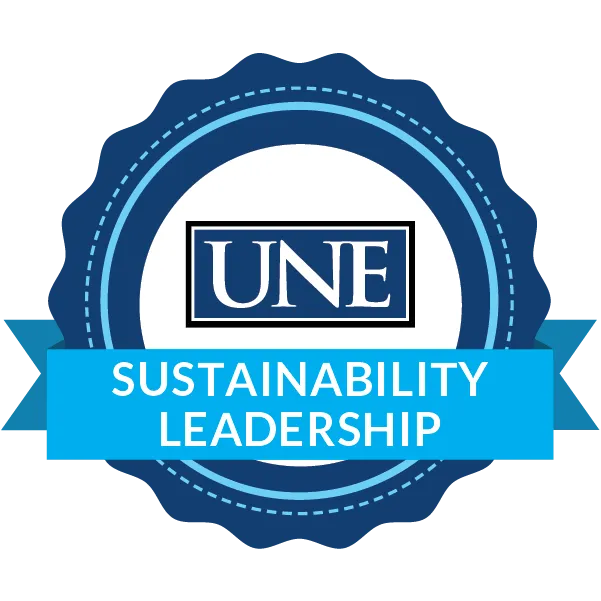Recognition for Environmental Student Leaders
As part of UNE’s Badging Program, the Sustainability Leadership Badge offers students a non-credit bearing opportunity to validate and document experiential learning and leadership competencies through the fostering of campus sustainability projects and habits of mind. The badge provides recognition of the advocacy and leadership efforts of learners who have a passion for environmental sustainability and can serve as an important credential on a resume by confirming one’s commitment to and competencies around environmental stewardship.
Criteria
Learners who earn this badge will have demonstrated their ability to:
- Engage stakeholders and build collaborative teams to further campus sustainability initiatives.
- Solve complex problems by analyzing current practices, determining benefits of and barriers to sustainable alternatives.
- Advocate for environmentally responsible practices by creating and communicating inspiring messages.
- Analyze and reflect on their own demonstration of sustainable choices and their leadership impact on the UNE community.
How to Earn the Sustainability Leadership Badge
To earn the badge, a student must demonstrate competency in four key areas:
- Engaging Stakeholders
- Solving Problems
- Communicating Effectively
- Leading by Example
Competency 1: Engaging Stakeholders
Engage stakeholders and build collaborative teams to further campus sustainability initiatives.
Learning Activities
- Students will respond to prompts in the planning and reflection stages of stakeholder engagement opportunities.
- Students will participate in, convene, or facilitate group meetings (or portions of meetings) where sustainability initiatives are discussed and decided.
Additional Information
Pre-engagement planning:
- Identify a sustainability-related project/initiative of interest.
- In thinking about the particular sustainability-related project or initiative, identify campus stakeholders (people or existing organizations) who could provide insight and/or approval to all aspects of the project/initiative.
- How might you approach engaging with these stakeholders?
- Describe the goals of your engagement.
Post-engagement reflection:
- Name of environmental sustainability-related club/organization in which you participated:
- Date(s) of meeting/event:
- What applied environmental sustainability-related project(s)/initiative(s) were discussed and digested during meeting/event:
- What was your role in the meeting(s)/event(s):
- Describe the relationships you formed during the meeting(s)/event(s) that help enhance your engagement? Who was present and how did you interact with them to deepen your engagement?
- How will your engagement with this sustainability-related club/organization expand your knowledge, development, and enhanced skills to advance campus sustainability initiatives?*
Culminating engagement reflection:
- Identify continued stakeholder meetings attended, convened, or facilitated for the purposes of advancing a particular sustainability-related project/initiative. (Group(s), date(s))
- What was your role in the meeting(s)/event(s):
- Reflect on your experiences with stakeholder engagement by providing insights into your expanded knowledge, development, and enhanced skills gained through your active engagement.*
- Describe how your engagement in these activities help you gain competence in learning about environmental sustainability issues and support your ability to advance environmental stewardship and sustainability efforts?*
- Reflections will be reviewed by the Assistant Director of Sustainability Office and deemed “acceptable” or not.
- Acceptable summary reflections will be included in the ePortfolio for Competency #4.
Competency 2: Solving Problems
Solve complex problems by analyzing current practices, determining benefits of and barriers to sustainable alternatives.
Learning Activity
- Students will complete the Environmental Council’s Project Initiation Form
Additional Information
- Project Initiation Form will be reviewed by the assistant director of Sustainability and feedback provided through the Project Initiation Form Rubric.
- Acceptable Project Initiation Forms may be forwarded by the student and/or assistant director of Sustainability to the Environmental Council for endorsement.
- Acceptable Project Initiative Forms will be included in the ePortfolio for Competency #4.
Competency 3: Communicating Effectively
Advocate for environmentally responsible practices by creating and communicating inspiring messages.
Learning Activities
- Students will initiate and participate in at least three approved communication activities that address chosen campus sustainability projects (e.g.: visual communication strategy, such as poster, Sustainable UNE Leaflet, Eco-Buzz blog article, Movements newsletter, etc., or outreach strategy, such as information table or presentation, etc.)
- Students will respond to self-reflection prompts for each of three communication strategies.
Additional Information
- Identify communication strategy 1, 2 and 3: (poster, article, etc.).
- Explain the purpose of the communication strategy.
- Reflect on your process in development of the communication strategy. What went well; what could be improved; did you receive adequate feedback during the process?
- Describe how your communication strategy (1, 2 and 3) met the intended goal.
- Describe how your engagement in these activities help you gain competence in learning about environmental sustainability issues and support your ability to advance environmental stewardship and sustainability efforts.
- Communication strategies will be evaluated by the Sustainability Office staff and deemed “acceptable” or not. Acceptable strategies will be published and distributed with the help of the Sustainability Office.
- Examples of the communication strategies and summary reflections will be included in the ePortfolio for Competency #4.
Competency 4: Leading by Example
Analyze and reflect on their own demonstration of sustainable choices and their leadership impact on the UNE community.
Learning Activity
- Students will complete final reflection prompts and create an electronic portfolio detailing their sustainability leadership journey.
Additional Information
- Please describe how you demonstrated initiative, commitment, and continued active engagement in environmental stewardship and sustainability efforts.
- Reflect on your learning by providing insights into your expanded knowledge, development, and enhanced skills you gained through your active engagement in environmental stewardship and sustainability experiences.
- Please reflect on how you attained your learning goals, how you applied your learning, and the impact of your work on the community.
- What do you consider to be the benefits of earning this badge for your personal choices, citizenship, and future career?
Electronic portfolio will summarize competencies 1-4 and include:
- Summarized reflections
- EC project initiation form (with or without rubric)
- Examples of communication strategies (multi-modal required)

